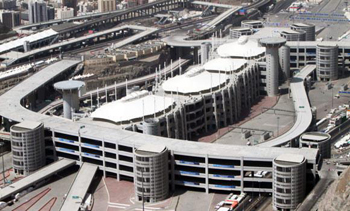 Jeddah, Oct 1: The newly expanded Jamrat bridge in Mina can accommodate 500,000 pilgrims per hour during the Haj season, said Prince Mansour bin Miteb, minister of municipal and rural affairs.
Jeddah, Oct 1: The newly expanded Jamrat bridge in Mina can accommodate 500,000 pilgrims per hour during the Haj season, said Prince Mansour bin Miteb, minister of municipal and rural affairs.
“The streets leading to Jamrat, however, cannot hold these many pilgrims. As a result, only 300,000 pilgrims can use the bridge per hour now,” he said, while stressing his ministry’s plan to expand Mina’s streets.
Meanwhile, Makkah Gov. Prince Mishaal bin Abdullah said preparations are complete for Haj. “The plan for welcoming pilgrims was successful,” he said, urging all government and private agencies to mobilize their human and technical resources to make the annual event a big success.
Prince Mishaal, who is chairman of the Central Haj Committee, instructed security officers not to allow pilgrims without Haj permits into the holy sites and impose sanctions on violators.
Prince Mansour said the Jamrat expansion would help pilgrims perform the “Satan-stoning” ritual easily without risking being stampeded.
The government implemented the SR4.2 billion multilevel hi-tech Jamrat bridge project a few years ago to facilitate the stoning ritual in Mina, which used to witness stampedes, causing several deaths in the past.
“The expansion of Mina streets will enable Tawafa organizations to send large numbers of pilgrims to the Jamrat in coming years,” the minister said. Security forces will be deployed around the Jamrat to ensure a smooth flow of pilgrim movement.”
He said the Jamrat bridge has been handed over to specialized companies for its operation and maintenance after the completion of works.
More than two million pilgrims, including 1.4 million foreign Hajis, are expected for the annual pilgrimage, which will start on Oct. 2, with the faithful assembling in the tent valley of Mina.
A number of foreign heads of state, including Sudanese President Omar Bashir, Somali President Hassan Sheikh Mahmoud and Maldives President Abdulla Yameen, have arrived for Haj.
According to the Presidency of Meteorology and Environment, the weather in Makkah, Madinah and other holy sites would be milder this season, with temperatures reaching below 36 degrees Celsius.
All foreign pilgrims have already arrived in Makkah. Pilgrims who arrived in Madinah have left for Makkah in preparation for Haj.







.jpg)
.jpg)
Comments
Add new comment